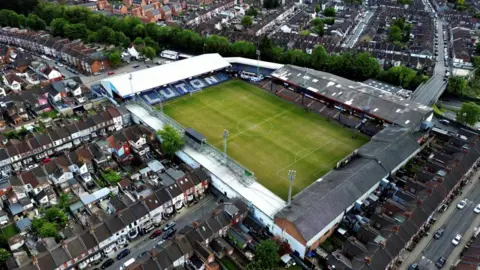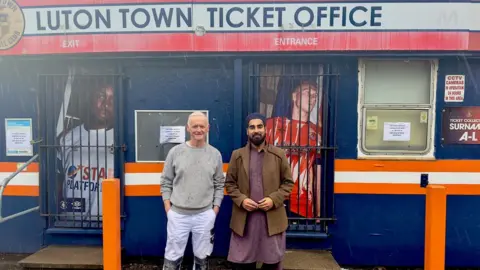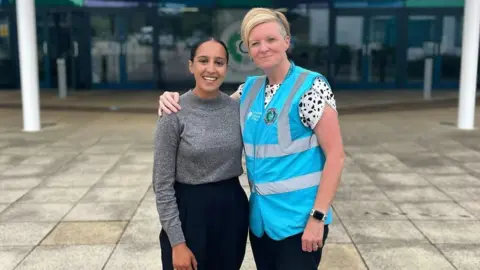Luton Town: How Premier League football is uniting the area
 Ronald Grant
Ronald GrantThey've been through relegation heartache, financial meltdown and penalty shootout drama, but Luton Town have finally made it to the Premier League.
Their cosy and compact Kenilworth Road home - famous for its much-memed away-end entrance - is in the densely populated Bury Park area of the town.
It's about to host some of the biggest names and teams in world football, starting with their first home game of the season against West Ham United later.
But English football's top tier is a world away from a place labelled the worst to live in England in 2023 and which has been plagued by claims of extremism and racial division.
So what does Luton's promotion to the Premier League mean for those living in the town's diverse community?
BBC Asian Network spoke to people there about how the club's success can help transform a place often painted as divided.
A town of two halves

Luton is known as the birthplace of the English Defence League (EDL), a far-right anti-Muslim group.
But it is also a diverse area, with no single ethnic group in the majority.
According to the 2021 census, just under half of people living in Luton identified as white, compared with more than 80% across England overall.
More than a third of people in Luton were from Asian ethnic groups, compared with just under a tenth across the whole of England.
And it was football that helped to form an unlikely friendship between a Muslim community leader and a former EDL member.
Imam Dawood Masood reached out to Darren Carroll in 2017 and invited him to his local mosque for a chat over a cup of tea.
"The main aim was to show that in the end we're all human," Dawood says.
"We may have different skin colours or we may have different ethnicities, but you can't judge a person by one small interaction."
Darren - who has since left the EDL - says he was initially unsure about meeting up but the pair found common ground almost instantly and bonded over football.
"I wanted to take this journey of reconciliation [and] correct things I felt that I had done wrong. If it wasn't for that welcome and acceptance, who knows where I would be now."
Darren repaid the favour by taking Dawood to what he says is his place of worship - Kenilworth Road - where the community leader saw his first match.
"Once you're inside the ground together it's a unifier. You're all from Luton, all wanting the same thing," Darren says.
'It feels like it's our team now'
 Raxstar
RaxstarLuton-born rapper Raxstar says the positive mood surrounding Luton's promotion has been a contagious one.
The club are nicknamed the Hatters because of the town's historical connection with the hat-making trade.
And Raxstar thinks fans have another new opportunity to succeed off the football pitch.
"Being in the Premier League, there's a big opportunity for Luton to level up in many different ways outside of football as well," he says.
"You walk around Luton and there's a feeling of optimism. It's incredible how football can do that."
Raxstar also thinks Luton's recent success is changing the relationship British Asians have with the club.
"It was kind of foreign to us, like it was a different part of Luton," he says.
"It didn't seem like it was our team or that we were part of that whole thing."
The rapper first noticed this switch when he realised his cousins and brother were referring to the football team as "we".
"I was just observing like 'when did it become we?' It used to be 'they' now it's turned to 'we'.
"It feels like it's our team now."
Luton's lasting legacy

One of football's biggest challenges is improving representation within the game, something Hina Shafi knows all about as a South Asian woman.
She's a massive Luton fan and is the club's Her Game Too ambassador.
The 25-year-old discovered her love of the game in primary school, but needed some help convincing her parents later on in life about pursuing a career in it.
Luckily for Hina, she found an ally in her teacher at the time at Challney High School for Girls.
Nicola Ponsonby, who is the deputy head there, helped reassure Hina's parents that she should pursue a career in football.
And the teacher is hopeful Luton's promotion will encourage more young girls to consider taking up jobs in the sporting sector.
"The buzz in the local town has been amazing and having a Premier League club in our town will inspire young people," she says.
Hina also hopes she can be a role model for young people from a South Asian background who want to get into working in sport.
"Both my parents are immigrants [and] knowing what they went through to get through education, I felt a bit guilty following my passion," she says.
"But honestly I'm so happy that I did."


BBC Asian Network's Ankur Desai returns to his hometown to find out how promotion to the Premier League is impacting those on the ground.
You can listen to all four episodes of 'Luton Town: No Place Like Home' on BBC Sounds.
